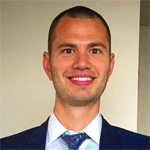
Dr. Baker
Some other key qualities to look for in a mentor is someone who shows interest in the mentee as a person, makes time to meet regularly, models respect and patience, communicates efficiently and effectively, and challenges those around them to learn and grow. “Ultimately, both the mentor and mentee have to mutually choose each other by agreeing to enter the relationship and commit to the defined purpose of the mentor–mentee experience,” Dr. Koster says.
Although personality is important, Dr. Baker points out that a mentor is not a friend in the traditional sense of the word. “It is better to choose someone [as a mentor] who can remain objective, impose structure and give criticism when necessary, rather than someone who takes a less rigorous approach due to overfamiliarity,” he says. “The ideal mentor is someone you enjoy being around, who is able to maintain a clearly defined role as a mentor and who always keeps the focus on the mentee’s development.”
Traditional Roles

Dr. Warrington
As someone who is responsible for the mentee’s career development, the mentor should assist with developing specific career goals and outcomes. A mentor should function as a role model, conducting themselves in a way that the mentee will recognize and incorporate. “‘Actions speak louder than words’ is key to mentoring,” says Richard Brasington, MD, FACP, professor of medicine, and rheumatology fellowship program director, Washington University School of Medicine St. Louis, Mo. “When my fellows are trying to make career decisions, the most useful thing that I can do is to listen to what they are saying and then reflect that back to the fellow. Sometimes, they will tell me what they want to do, but they have not realized it yet.”
Providing wisdom, which is gained through experience, is key. Many exposures to clinical, research and educational opportunities have shaped my current career. I share these experiences with my mentees,” says Kelly Rouster-Stevens, MD, MS, associate professor of pediatrics and pediatric rheumatology fellowship program director, Emory University School of Medicine/Children’s Healthcare of Atlanta. “Most have been positive, but some have been negative and are important to the learning process.”

Dr. Brasington
From a research perspective, a mentor should make time to discuss research projects, formulating and reviewing research protocols and grants, data interpretation, abstract preparation and editing manuscript drafts. “Regularly scheduled meetings are essential to review progress and allow time for adequate discussion,” Dr. Warrington says. “Assisting the mentee with making connections to other researchers and collaborators is also an important role.”
Important Attributes
Mentors should have a passion for their careers. “Without this, they will have a difficult time inspiring, guiding and encouraging mentees,” says Dr. Rouster-Stevens.


